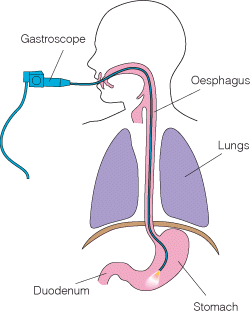Gastroscopy
What is a gastroscopy?
This procedure involves an endoscope (a long, thin flexible tube with a camera lens at the tip) being passed through the mouth into the oesophagus, stomach and first part of the small bowel.
This allows the doctor to inspect these areas as well as perform specialised procedures, such as a biopsy.
A gastroscopy is performed as day surgery in hospital.
Why is a gastroscopy done?
A gastroscopy is usually performed to evaluate symptoms of indigestion, upper abdominal pain, nausea, vomiting or difficulty swallowing. It is also the most effective test for finding the cause of upper gastrointestinal (GI) bleeding. It is more accurate than an x-ray for detecting inflammation, ulcers or tumours in the upper GI tract. Biopsies (samples of tissue) can be taken to determine sites of infection, to test the functioning of the small bowel, and to diagnose abnormal tissue, including conditions such as coeliac disease and cancerous lesions.
A gastroscopy is also used to treat upper GI tract conditions. Your doctor can pass small instruments through the endoscope to directly treat many abnormalities with little to no discomfort. For example, your doctor might stretch a narrowed area, remove polyps (usually benign growths) or treat bleeding.

Why choose Dr Sina Malki?
- Years of experience
- Passionate doctor
- Offers holistic care
- GESA and FRACP member
- Offers thorough consultations
- Committed to delivering excellence in health care

